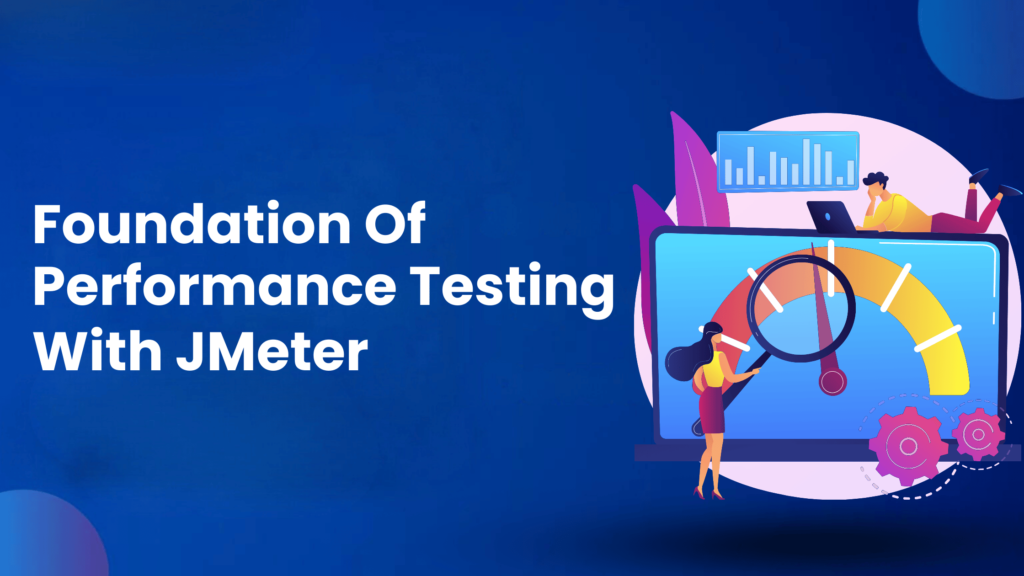

Foundation of Performance Testing with JMeter
In this exponentially evolving digital landscape, software performance is crucial. Performance testing ensures that applications run smoothly under various conditions, providing an optimal user experience. Unfortunately, many companies delay performance testing until issues become critical, forcing engineering teams to perform tests under tight deadlines. This blog aims to guide you through the fundamentals of performance testing with Apache JMeter, an open-source tool, helping you understand its importance and how to leverage it effectively.

Performance testing is a type of non-functional testing that evaluates the speed, scalability, reliability, etc. of a software application under different workloads. The primary objectives include:
- Measuring the time taken by the application to respond to user requests, which is called the ‘Response Time’.
- Assessing the number of transactions the application can handle in a given time, which is the ‘Throughput’.
- Evaluating the usage of system resources like CPU, memory, and network which is ‘Resource Utilization’.
- Determining the application’s ability to scale up or down with varying loads, which is ‘Scalability’.
- Ensuring the application remains stable under different stress conditions, which is called ‘Stability’.
These objectives help identify performance bottlenecks, ensuring the application meets user expectations and business requirements
The answer to the question ‘Why is performance testing important?’ lies in its direct impact on user satisfaction and business profitability. Improved application performance enhances user experience, builds brand reputation, and boosts customer retention. Efficient performance also optimizes resource utilization, reducing operational costs. Today’s web users are impatient and discerning. Studies from two decades ago indicated that users would abandon a website if it took more than six seconds to load. In today’s fast-paced world, this threshold has likely dropped significantly. Thus, performance testing is crucial for maintaining competitiveness in the digital marketplace.
Despite its importance, many companies need help with performance testing due to budget constraints for commercial tools. This is where Apache JMeter comes in. JMeter is a powerful, open-source performance testing tool that offers robust capabilities without the associated costs of commercial solutions.

Apache JMeter is an industrial-strength performance testing tool developed by the Apache Software Foundation. It has been continuously improved since its inception in 2001 and is widely used due to its extensive features and flexibility. JMeter supports performance testing for web applications, databases, FTP servers, and more. While commercial tools may offer polished interfaces and visually appealing reports, JMeter can be configured to match these capabilities. It supports distributed testing, allowing you to generate the load of thousands of users across multiple machines. Moreover, JMeter’s open-source nature means it can be used, modified, and distributed freely, making it an attractive option for organizations with limited budgets.

The Financial Times (FT) they conducted a comprehensive performance test to analyze the impact of website speed on user engagement and revenue. Their study revealed that even a minor delay in page load times had significant repercussions. Specifically, they found that a one-second delay led to a measurable decrease in user engagement and, consequently, an adverse effect on subscription conversions and ad revenues over time (Financial Times, 2016).

During peak shopping seasons like Black Friday, Amazon performs extensive performance testing to ensure its platform can handle the massive surge in traffic and transactions. Through rigorous testing with tools like Apache JMeter, Amazon ensures that its website remains stable and responsive under extreme load conditions. This proactive approach not only prevents downtime but also safeguards their reputation and revenue during critical sales periods.

Netflix, a global leader in streaming services, employs continuous performance testing to maintain optimal streaming quality across various devices and regions. They utilize tools similar to JMeter to simulate user traffic and ensure seamless playback experiences. By continuously monitoring and optimizing their platform’s performance, Netflix enhances user satisfaction and retention, crucial metrics for their subscription-based business model.

Healthcare.gov, the U.S. government’s health insurance marketplace, faced significant challenges during its initial rollout due to performance issues. To rectify these issues, extensive load testing was conducted to simulate peak traffic scenarios and identify bottlenecks. Tools like JMeter helped in diagnosing and resolving issues before they impacted user access, highlighting the importance of thorough performance testing in mission-critical applications.
Performance testing is an essential aspect of delivering high-quality software that meets user expectations and business goals. Apache JMeter provides a powerful, flexible, and cost-effective solution for performance testing. Investing in performance testing not only improves user satisfaction but also enhances the overall efficiency and profitability of your business.Remember to practise, stay updated with the latest trends in Performance Testing with JMeter ,and maintain a positive attitude throughout your interview process. Embrace JMeter and its capabilities to stay ahead in the competitive digital landscape, providing users with a fast, reliable, and seamless experience.
Also read:
Consult Us


















